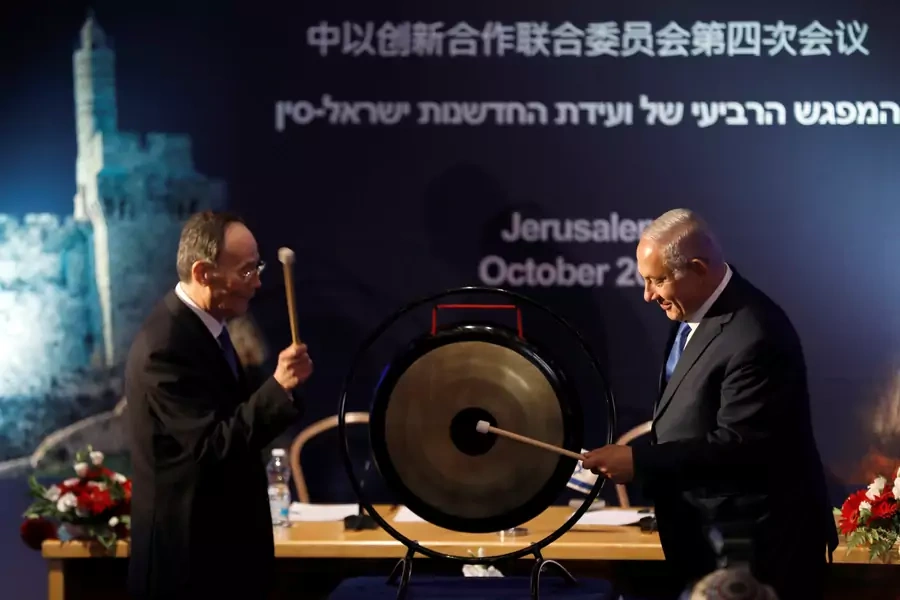Caught Between Giants: How Will Israel Navigate the U.S.-China Tech Cold War?

Omree Wechsler is the head of cyber research at Yuval Ne'eman Workshop for Science, Technology and Security in Tel Aviv.
Israel is a key technology and innovation center. In the World Economic Forum's Global Competitiveness Report 2016-2017, Israel is ranked as the second most innovative nation in the world. In the Compass Global Startup Ecosystem's 2015 report, Tel Aviv's ecosystem ranked fifth worldwide and first among sites located outside of the U.S. According to Asgard Human Venture Capital, Israel ranks third in the world for AI solutions with a market share of 11 percent. Given its close diplomatic and security ties with the United States, on the one hand, and its growing economic ties with China on the other, it’s worth asking, where does Israel stand amidst the U.S.-China trade war?
More on:
At the center of the ongoing trade war is a competition over technology. Almost a year ago, U.S. lawmakers warned that China had been increasing its efforts to close the technology gaps with the United States, in part through acquiring technology abroad. In February 2018, the Committee on Foreign Investment into the United States (CFIUS) stepped in to delay Broadcom’s attempt to buy Qualcomm—a $142 billion deal which administration officials worried would give Chinese telecommunications giant Huawei an upper hand in the 5G race—which President Trump later blocked. The U.S. government's attempt to block Chinese investment in the U.S. tech sector did not stop there and in August Trump signed a bill that would strengthen CFIUS jurisdiction and powers.
The US is not alone in trying to prevent key technologies from being transferred to Chinese entities and its technological and trade secrets from being stolen. In April, Germany’s head of domestic intelligence warned of increased moves by Chinese companies to invest in and acquire high-tech German companies, noting that the loss of key technologies could harm the German economy. In addition, Australia and Japan banned Chinese telecommunication companies from supplying equipment to 5G cellular networks infrastructure out of fear of cyber espionage.
Israel stands as a notable exception to this trend. Trade relations between Israel and China have been on the upswing, having grown 30 percent in the first half of 2018 compared with the same period in 2017. This is in large part because Chinese firms are interested in Israel's innovation and technological capabilities and Israel welcomes their investments. The relationship is mutually beneficial: Israel has an interest in increasing its exports to the huge Chinese market, as well as increasing foreign investments in its local industries. Israel also hopes that its growing relations with China will prevent it from supporting its regional adversary, Iran. China wants to further develop its research and development infrastructure and to acquire key technologies, especially in advanced manufacturing and AI. Stronger CFIUS enforcement has led Chinese investors to turn to other international tech hubs like Israel.
However, warming ties between China and Israel could put Israel on a collision course with the United States. The Trump administration is likely to pressure Israel to limit its exposure to Chinese investors, particularly in key technologies like cyber and AI. Israel has no equivalent to CFIUS and Israeli law does not grant the government authority to block foreign investments. While the Israeli export control regime may intervene with regards to the transfer of military or dual-use technologies to China—something that Israel has refrained from doing at the request of the United States—Israel does not appear keen on limiting the exports of civilian technological equipment. Yet civilian technology can provide a strategic advantage. One such example is Chinese Midea Group’s acquisition of Israel's Servotronix. The automation solutions manufacturer focuses on customized motion control solutions for high-tech industries such as semiconductors and industrial robotics, two fields where China is looking to surpass the United States.
At least for the time being, Israel is likely to shirk from assessing the uncomfortable implications of its ties with China and continue to maneuver between both superpowers. This fits into a pragmatic political culture which has dominated since Israel’s founding. Moreover, Prime Minister Benjamin Netanyahu is the chief architect behind Israel’s push for closer technological ties with China, and there currently seems to be no politician who can successfully challenge him in the foreign policy sphere. However, Israel’s interest in China will always be secondary to its close ties with the United States. Should push come to shove and Washington exert serious pressure, there is no doubt Israel would side with the United States.
More on:
As the Trump administration ratchets up its campaign to prevent China from obtaining key technologies, Israel needs to examine alternatives and assess different scenarios for its relations with the two superpowers. It may be wise to consider establishing a local CFIUS-like body to review foreign investments and acquisitions with strategic consequences. No matter what options are on the table, if the U.S.-China trade war deepens, Israel will have to pick a side
 Online Store
Online Store